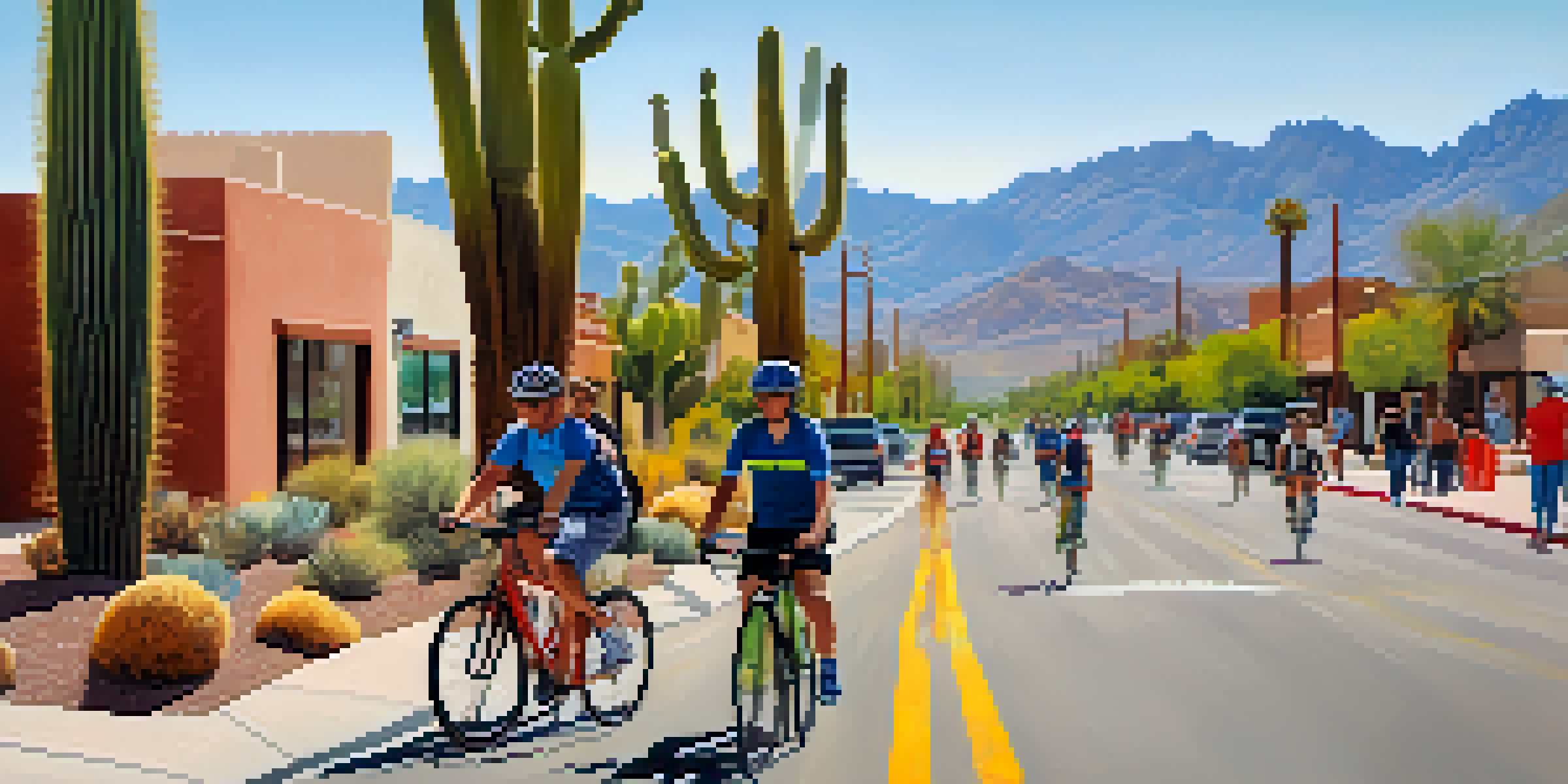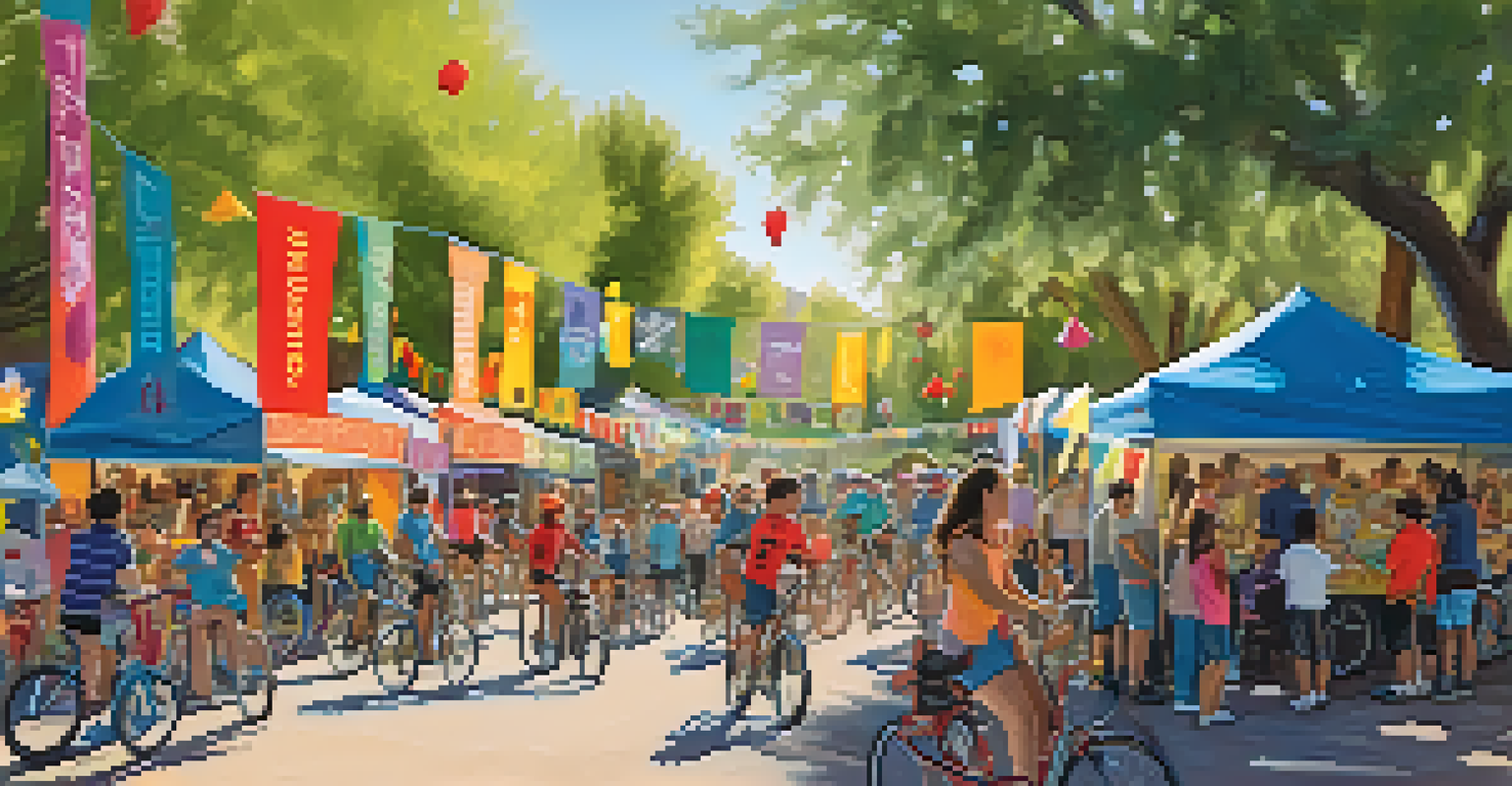Advocacy for Cyclists: Tucson's Efforts to Improve Safety

Understanding Tucson's Cycling Landscape and Challenges
Tucson, with its sunny weather and scenic views, is a haven for cyclists. However, the city also faces significant challenges regarding cyclist safety. From busy roadways to limited bike lanes, many cyclists find themselves navigating a precarious environment.
Cycling is a way of life for many people, a sustainable and healthy mode of transport that needs to be supported and protected.
Advocacy groups have emerged in response to these challenges, working tirelessly to bring attention to the needs of cyclists. They aim to transform Tucson into a more bike-friendly city, ensuring that cyclists can enjoy their rides without fear. This grassroots movement highlights the importance of community involvement in effecting change.
Local cyclists often share their experiences of close calls with vehicles, which emphasizes the urgent need for improved infrastructure. The stories of these riders not only raise awareness but also foster a sense of solidarity among the cycling community. Together, they are pushing for a safer environment for everyone.
Key Advocacy Groups Leading the Charge in Tucson
Several organizations are at the forefront of advocating for cyclists in Tucson. Groups like the Tucson Bicycle Advisory Committee and the Coalition of Arizona Bicyclists focus on creating safer roads and promoting cycling as a viable mode of transportation. Their efforts include lobbying for better bike lanes and more cyclist-friendly policies.

These organizations often host community events, workshops, and rides to engage the public and raise awareness about cycling issues. For example, they might organize a 'Bike to Work' day to encourage commuters to consider cycling as an alternative. Such initiatives not only promote cycling but also strengthen community ties.
Cyclist Safety is a Community Effort
Advocacy groups and local cyclists are working together to improve safety and infrastructure in Tucson.
Collaboration is key in these advocacy efforts, as these groups work closely with local government officials and urban planners. By providing valuable input and feedback, they help shape policies that prioritize cyclist safety. This partnership is vital to ensuring that cyclists' voices are heard in the decision-making process.
Recent Initiatives to Improve Cycling Infrastructure
Tucson has made significant strides in recent years to improve its cycling infrastructure. Recent initiatives include the expansion of bike lanes and the installation of protected intersections. These changes aim to create safer spaces for cyclists and encourage more people to take up cycling.
The bicycle is a curious vehicle. Its passenger is its engine.
One noteworthy project is the 'Complete Streets' initiative, which focuses on designing roadways that accommodate all users, including cyclists. This project not only improves safety but also enhances the overall aesthetic of neighborhoods. By integrating bike lanes into street designs, Tucson is setting a precedent for other cities to follow.
Community feedback plays a crucial role in these initiatives. Residents are encouraged to share their thoughts during public meetings, ensuring that the infrastructure meets the needs of cyclists. This collaborative approach fosters a sense of ownership among the community and strengthens support for ongoing improvements.
Cyclist Safety Education and Awareness Programs
Educating both cyclists and motorists about road safety is another critical aspect of Tucson's advocacy efforts. Programs aimed at improving awareness of cycling rules can help prevent accidents and create a more harmonious shared roadway. These initiatives often include workshops and informational campaigns.
For instance, local schools may host bike safety classes, teaching children how to ride safely and understand traffic signals. Empowering the younger generation with this knowledge ensures that they grow up as responsible cyclists. Such programs not only enhance individual safety but also foster a culture of respect on the roads.
Education Drives Safe Cycling Culture
Programs aimed at educating both cyclists and motorists are crucial for fostering a respectful and safe road-sharing environment.
Moreover, advocacy groups often collaborate with law enforcement to conduct community outreach. By discussing safety tips and the importance of sharing the road, they bridge the gap between cyclists and drivers. This dialogue helps to create a safer environment for everyone using Tucson's roads.
Community Engagement: Building a Supportive Cycling Culture
Building a cycling-friendly culture in Tucson requires active community engagement. Advocacy groups organize events like community bike rides and festivals that celebrate cycling. These gatherings not only promote cycling but also create a sense of camaraderie among participants.
Social media plays a significant role in fostering this community spirit. Many local cycling groups use platforms like Facebook and Instagram to share news, tips, and upcoming events. This online presence helps to keep cyclists connected and informed, encouraging more people to join the movement.
Furthermore, local businesses are increasingly supporting cyclists by offering discounts or services tailored to them. This symbiotic relationship between businesses and cyclists benefits both parties, promoting a thriving cycling culture. As more people embrace cycling, Tucson becomes a more vibrant and connected community.
Collaborating with Local Government for Policy Change
Advocacy for cyclists in Tucson is not just about grassroots efforts; it also involves collaborating with local government. Advocacy groups regularly meet with city officials to discuss policies that impact cyclists. These discussions are crucial for promoting legislative changes that prioritize cyclist safety.
One of the key focuses of these collaborations is securing funding for cycling infrastructure projects. By presenting data and community support, advocacy groups make a strong case for investing in safe bike lanes and facilities. This partnership between advocates and government officials can lead to significant improvements in cyclist safety.
Collaborating for Cycling Policy Changes
Effective collaboration between advocacy groups and local government is essential for implementing policies that prioritize cyclist safety.
Moreover, public forums and city council meetings allow residents to voice their concerns and ideas. This open dialogue ensures that the cycling community's needs are represented in local governance. As a result, Tucson can implement policies that reflect the desires of its cyclists, creating a safer environment for all.
The Road Ahead: Future Goals for Tucson's Cycling Advocacy
Looking forward, Tucson's cycling advocates have set ambitious goals to continue improving cyclist safety and infrastructure. One of the main objectives is to expand the city’s bike lane network, connecting neighborhoods and key destinations. This would not only enhance safety but also encourage more residents to choose cycling as their primary mode of transport.
Additionally, advocates are pushing for more education and awareness campaigns aimed at both cyclists and drivers. They believe that by fostering mutual respect and understanding, Tucson can significantly reduce accidents involving cyclists. More workshops, safety programs, and community events are on the horizon.

Ultimately, the goal is to create a cycling-friendly culture that promotes healthy living and sustainability. As Tucson continues to evolve, the efforts of these advocates will be crucial in shaping a future where cycling is safe, accessible, and enjoyable for everyone.